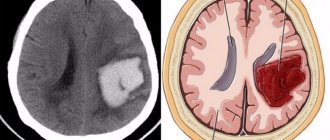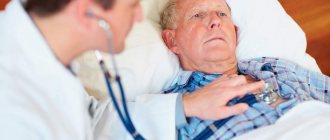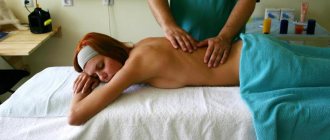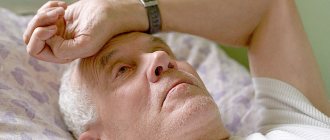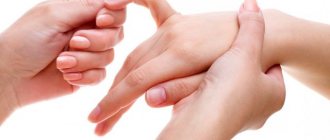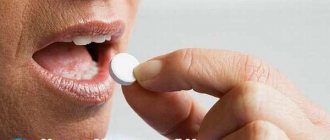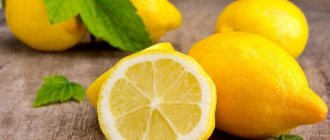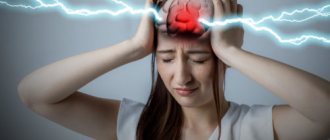Mechanism of influence of alcohol
Alcohol consumption leads to the development of a number of physiological reactions, which include:
- Expansion of the vascular bed - the effect depends on the dose of alcohol and the type of alcoholic drink. Wine in small doses has a beneficial effect on blood vessels. Stronger drinks, as well as the intake of significant amounts of alcohol, lead to subsequent spasm of the arteries and an increased risk of developing vascular complications.
- Impact on a number of receptors in the cerebral cortex and subcortical structures, which results in a feeling of euphoria or intoxication.
- Changes in the rate of metabolic processes, which primarily affects hepatocytes (liver cells).
When large doses of alcohol are consumed in the body, incomplete decomposition products (acetaldehyde) accumulate, which have a pronounced toxic effect on various tissues, including the structures of the nervous system and blood vessels.
Important! One dose (“drink”) of alcohol, which is allowed for consumption by the World Health Organization, is equivalent to 30 ml of pure alcohol.
Drinking tea for stroke
The diet after a stroke includes eating whole grains, sea fish, and vegetable oils. It also includes raw vegetables and fruits, tea and multivitamins. An optimal diet recommends limiting foods containing sugar, salt and alcoholic beverages. Doctor of Medical Sciences, neurologist E.R. Lebedeva reports on studies in which tea was given to stroke patients. An analysis of 9 long-term studies concluded that if you take 3 cups of black tea a day, the risk of stroke is reduced by 21%. According to the results of studies by Chinese scientists, it was found that 1 cup of tea per week also prevents the risk of stroke.
In the acute period, weak, warm tea is allowed. Please note that black long tea increases, and green tea lowers blood pressure. Black tea with lemon does not increase, but regulates blood pressure. Milk weakens the effect of tea. For hypertension, it is recommended to use green tea. It is also useful because it lowers blood cholesterol. In case of stroke, tea has a positive effect on the blood vessels of the brain. Caffeine and vitamin P in tea dilate cerebral vessels, thereby increasing blood supply to the brain. Drinking 3 cups of tea daily speeds up the recovery of brain function after a stroke.
Is alcohol necessary for the body?
Alcohol is a compound essential for normal metabolism. It is produced in small quantities in liver cells and is needed for the normal course of certain metabolic processes. It is believed that drinking small amounts of alcoholic beverages can have health benefits:
- Cognac – a small amount of the drink, no more than 70 g per day, will be useful; in moderate quantities it has a positive effect on the stomach and blood vessels.
- Vodka is not inferior in strength to cognac, so a small amount is allowed.
- Wine drinks - no more than 150 ml per day is allowed; dry and semi-sweet red wine is more beneficial, which have a positive effect on the metabolism and activity of the red bone marrow. Champagne can have a negative effect, since carbon dioxide increases the absorption of alcohol from the stomach into the blood.
- Beer, despite the fact that it is a low-alcohol drink, can have a negative effect on the mucous membrane of the stomach and duodenum, increasing the risk of developing erosive and ulcerative changes. The allowed volume is no more than 0.5 liters per day. A well-brewed drink contains a large amount of B vitamins, which have a positive effect on the structures of the peripheral nervous system. Despite the absence of alcohol, non-alcoholic beer can have a negative effect on the digestive and cardiovascular systems.
Juices for apoplexy
To restore brain function after a stroke, you need a complex of vitamins contained in the juice of fruits and vegetables. In the acute period, patients are given diluted orange juice. After a few days, fresh juices are allowed. During a stroke, juices containing vitamins E and B are needed. They are found in green tea and plant leaves.
It is useful for a patient after a stroke to drink freshly squeezed juices; it is usually recommended to start with orange juice
Celery and beet juice contain sodium, which regulates sodium-potassium balance. Fresh cucumber juice contains potassium and phosphorus needed by the brain. Vitamins and minerals contained in carrot juice regulate metabolic processes in brain neurons. Parsley juice, by strengthening blood vessels, restores the functions of nerve cells and improves blood flow in cerebral vessels. You can consume no more than 50.0 ml per day. Lemon juice contains vitamin C and minerals. It improves immunity and has a general strengthening effect on the body during a stroke. Juice cocktails are recommended. A mixture of juices from cucumber, beets and carrots in a ratio of 3:3:10 parts is good for the brain. A mixture of spinach and carrots in a ratio of 3:5 is also useful.
Read also: Gymnastics after a stroke video
Juices should be prepared immediately before consumption.
They are taken in courses of 2 weeks. It is recommended to drink juices 3 times a day half an hour before meals. Vegetable juices should be taken 1 glass per serving. Juices from forest plants are drunk 1/4 glass three times a day.
Alcohol after a stroke
The compatibility of alcohol and stroke is controversial. After a significant amount of alcohol is absorbed into the blood, changes develop in the blood vessels and nervous tissue, which in their course resemble the pre-stroke state. There are several factors that increase the negative impact:
- Type of drink - in case of a cerebral stroke, the consumption of almost all alcoholic beverages is excluded. The exception is dry wine, which can be taken in small quantities.
- Quantity - the dose of red wine that can be taken after suffering an acute pathological condition should not exceed 150 ml.
- The reason for the development of the pathological process, as well as the volume of affected tissues - after a micro-stroke, drinking a small amount of dry wine does not cause harm. Vodka with fatty fried foods should be excluded, as this often aggravates the pathological process with damage to a large volume of tissue.
- Age of the person – Younger people have a lower risk of developing complications after drinking alcohol.
- The presence of other bad habits - drinking alcohol and smoking - significantly worsens the prognosis after suffering a “vascular accident”. If a person does not modify his lifestyle, he will live for a short period of time.
- The nature and pathogenesis (mechanism of development) of changes in brain tissue - in case of ischemic stroke (death of a tissue area caused by hemorrhage in them), it is better not to drink alcohol at all, even dry wine.
- Low-quality drink or counterfeit - regardless of the previous pathological condition, you can only take proven and high-quality alcoholic products, since low-quality alcohol can lead to poisoning and the development of a recurrent stroke.
- The duration of the stroke - there is a dependence on the time that has passed since the acute pathological condition and the negative influence of alcohol. For several months, or better yet about six months after a stroke, you should stop drinking alcohol altogether.
- Taking medications – usually after a person has had a stroke, they are prescribed certain medications for life. Some of them can interact with alcohol, leading to the development of unpleasant consequences and complications.
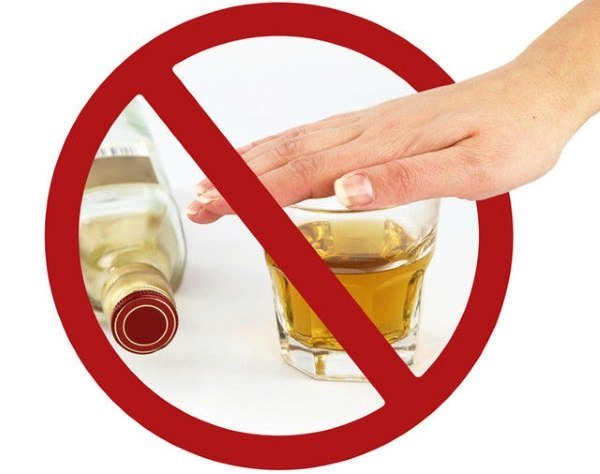
In general, for a long period of time after suffering an acute pathological process, it is better to stop drinking alcohol. It is also important to modify lifestyle, rationalize nutrition, moderately increase physical activity, and also ensure adequate sleep and rest of the body.
Important! If you continue to drink alcohol-containing drinks in large doses after a stroke, the risk of death increases by 2 times.
Diet
To ensure that the treatment is more beneficial, and that you don’t have a second stroke after a couple of years, stick to the diet throughout your life. To do this, exclude:
- alcohol and cigarettes,
- foods high in cholesterol,
- fried, salted and confectionery products.
Try to add more fruits, vegetables, vitamins, dairy and seafood to your diet. Don't forget about water balance - drink 1.5-2 liters of water, juices, herbal teas every day.
Consequences
Drinking alcohol after a stroke without taking into account recommendations is a common cause of consequences, the most common of which are:
- A fatal outcome that can occur as early as 2 years after a stroke if alcohol is consumed.
- Repeated stroke, which is more severe in relation to the primary pathological condition.
- Thrombosis of various vessels, characterized by the formation of blood clots. They can break off, migrate with the bloodstream and clog arteries of smaller diameter.
- Myocardial infarction - there is a clear connection between drinking alcohol after a stroke and the subsequent development of a condition accompanied by the death of part of the heart muscle.
- The risk of developing physiological and psychological dependence, the main symptom of which is an irresistible craving for drinking alcoholic beverages.
- Violation of the functional state of the liver and bile ducts with the development of the inflammatory process. With long-term systematic abuse of alcoholic beverages against the background of toxic inflammation, hepatocytes are gradually replaced by connective tissue with the development of liver cirrhosis.
- Pathology of the hollow structures of the digestive system, which is often accompanied by a violation of the integrity of the mucous membranes (peptic ulcer, erosive inflammation).
- Damage to pancreatic tissue with inflammation (pancreatitis). The endocrine function of the organ can often suffer with a decrease in the activity of insulin synthesis and impaired carbohydrate metabolism. Therefore, against the background of alcohol abuse, diabetes mellitus type 1 or 2 often develops.
- A disorder of the metabolism of purine bases, accompanied by an increase in the concentration of uric acid and the deposition of its salts in the tissues of the joints. Often the pathology has characteristic signs in men and is accompanied by attacks of pain in the affected structures of the musculoskeletal system.
Alcohol as a risk factor
As a rule, when identifying the causes of a stroke, doctors pay special attention to risk factors that can affect blood circulation in the brain. Genetic predisposition, age over 55 years, excess body weight, etc. can affect the development of stroke.
How are stroke and alcohol related? Among the factors that provoke the disease, regular abuse of alcoholic beverages occupies a special place. This is due to the property of ethyl alcohol to have a detrimental effect on the vascular system. Experts have identified several reasons that, in combination with alcohol abuse, can provoke certain types of stroke. Against the background of alcoholism, blood vessels become fragile, arterial and capillary walls lose their elasticity and the likelihood of their perforation increases.
cardo-ufa.ru
Some experts point out the benefits of alcohol for the body, but alcohol should be consumed in moderation. Others talk about the absolute harm of ethyl alcohol. Sometimes doctors advise drinking in small doses to lower blood pressure. Alcohol dilates blood vessels. This leads to a decrease in blood pressure, but the heart begins to beat faster, and accordingly, more blood enters the vessels, and this is no longer desirable for the body.
In the future, the more often a person drinks, the worse his blood circulation will be. The level of some hormones, such as adrenaline, in the blood increases due to alcohol. If alcohol poisoning is chronic, then the body is often in a stressful state, which is not good for it, and mental disorders occur. If a person consumes alcohol after a stroke, the condition of the weakened body worsens even more, and the likelihood of a second stroke and death increases significantly.
The effect of alcohol on the body
Alcohol has a negative effect on all human organs and systems, there is no doubt about it. If initially any of the organs did not function well enough, alcohol will provoke an exacerbation of the pathology. The most negative effect of alcohol is on the human brain center, cardiovascular and digestive systems.
Alcoholism is a colossal social misfortune that “corrodes” the body from the inside and also causes great harm to others. “Governmental catastrophes”, “collective suicide of the nation”, “the path to the destruction of humanity” - this is the assessment given by scientists and the public in many countries of the increasing crime rate due to the abuse of alcoholic beverages.
When talking about the dangers of alcohol, people often forget that the main cause of stroke is increased intracranial pressure. It's time to forget about this and turn to traditional medicine.
It may not be promoted by doctors, but it remains effective and useful. First you need to figure out what kind of alcohol will be useful?
Cognac is the most healthy drink. Only its daily amount should be limited to 50 grams. This is enough to enhance brain activity and equalize pressure, so there will be no consequences.
Red wine is a good stimulant for the heart muscle. It provides irreplaceable support, supplementing the blood with useful substances. Its maximum daily amount should be limited to 150 grams. Only it should be a dry variety, not a semi-sweet one.
In what cases are alcoholic drinks completely contraindicated after a stroke?
Patients who have suffered a severe stroke and have negative consequences, as well as those who have an increased likelihood of recurrent hemorrhage, should not drink alcohol at all.
- drug therapy continues to maintain the body;
- motor ability has not been completely restored;
- alcohol was the cause of the stroke;
- there is no guarantee that the norm will not be exceeded (in case of alcohol dependence).
For the most part, after a stroke, one should be wary of large doses of alcohol and poor quality of alcohol-containing drinks. Naturally, immediately after a stroke, the body has not yet recovered, and even small doses of alcohol can be harmful.
But after the rehabilitation period, when there are no obvious threats to the body and the course of drug treatment is completed, the doctor can express his opinion about the patient’s possibility of drinking alcohol in the future.
Alcohol as a risk factor
As a rule, when identifying the causes of a stroke, doctors pay special attention to risk factors that can affect blood circulation in the brain. Genetic predisposition, age over 55 years, excess body weight, etc. can affect the development of stroke.
How are stroke and alcohol related? Among the factors that provoke the disease, regular abuse of alcoholic beverages occupies a special place. This is due to the property of ethyl alcohol to have a detrimental effect on the vascular system. Experts have identified several reasons that, in combination with alcohol abuse, can provoke certain types of stroke. Against the background of alcoholism, blood vessels become fragile, arterial and capillary walls lose their elasticity and the likelihood of their perforation increases.
Alcohol and stroke: can alcoholic drinks cause a brain stroke?
Can alcohol cause a stroke? How proven is the connection? Which alcoholic drinks are the most dangerous? What doses of alcohol can cause a stroke? How to reduce risks?
Alcoholic drinks increase the risk of stroke, and this has been scientifically proven. In the summer of 2020, the authoritative scientific journal The Lancet published data from a study in which more than 27,000 adults took part. The results showed that there are 10 risk factors that are responsible for 90% of strokes. This top ten also includes alcoholic drinks. They accounted for 5.8%. Not as much as, for example, for high blood pressure (47.9%), but it still matters.
Let's try to figure out how alcohol harms the heart and blood vessels, what it means for the brain, and whether it is possible to protect yourself by consuming a “safe” dose.
What can you drink after a stroke?
Having understood the causes of stroke, it is worth moving on to it. Now they are being well treated, and rehabilitation courses are based on the use of modern techniques. Only even they do not always give results quickly, but at the same time they contain a lot of important nuances:
- Mandatory diet;
- Elimination of alcohol;
- Walking in the air.
Mandatory diet
The rehabilitation period usually lasts for a year. At this time, the person will have to follow a strict diet, helping the body regain strength after a serious shock. No, doctors do not completely prohibit foods, but they require the addition of new dishes to the diet:
- Vegetables;
- Fruits;
- Seafood.
Alcohol exclusion
When considering the diet, doctors pay special attention to alcohol-containing drinks. They are strictly prohibited, since changes in pressure during the rehabilitation period are unacceptable. No, some people are still willing to take risks, but they should seriously think about their own step. What drinks do experts recommend?
- Pure water;
- Compotes;
- Natural juices;
- Cocoa.
These drinks do not affect blood flow, so patients in sanatoriums drink them without restrictions. Even tea or coffee negatively affects the cardiovascular system. This fact has long been confirmed by research, so experts point it out without fail.
Walking in the air
Having suffered a stroke will require gradual recovery of the body. For this reason, former patients also have to be excluded. In practice, this can be solved in several ways that do not require much time.
If the rehabilitation period is carried out in a special center, the person will be offered courses of therapeutic exercises. It helps to gradually restore muscles, with virtually no stress on them. This approach guarantees a simple and reliable solution, because it is not always possible to cope with the consequences of an attack without problems.
However, a group of specialists from France claims that the consumption of dry red wine is one of the factors reducing the risk of stroke. The fact is that 2/3 of all stroke cases are of the ischemic variety, that is, they are caused by blockage of the arteries. However, consuming good dry red wine thins the blood, promotes the removal of fats and reduces the rate of development of atherosclerosis. Therefore, if the question of what you can drink after a stroke is particularly acute, then it is better to drink wine.
Dry red wine is safest after a stroke
There is still no consensus on how red wine reduces the risk of stroke. Some experts believe that this is due to tannins, which are found in abundance in red wine, while others attribute the benefits of the drink to the biologically active substances present in it.
It is important to emphasize that it is useful to drink only dry red wine obtained by grape fermentation, without added sugar.
Any products based on wine, port wine and other alcoholic drinks do not have any healing qualities. Therefore, the question of whether you can drink beer after a stroke should not arise at all. Regarding whether it is possible to drink dry red wine after a stroke, everyone decides for themselves. But if a person cannot afford a high-quality and often expensive product, then it is better to completely give up alcohol.
Scientists: alcohol increases the risk of any type of stroke
The most clear demonstration of the connection between alcohol and different types of stroke is a study conducted in 2020 by scientists from Sweden and the UK. This was a large meta-analysis that included 18,289 cases of ischemic stroke, 2,299 cases of intracerebral hemorrhage, and 1,164 cases of subarachnoid hemorrhage.
Depending on the level of alcohol consumption, the researchers divided all participants into groups:
- light drinkers: 1 drink per day or less;
- moderate drinkers: 1–2 drinks per day;
- heavy drinkers: 2–4 drinks per day;
- heavy drinkers: more than 4 drinks per day.
It turned out that light and moderate alcohol consumption (up to 2 drinks per day) helps reduce the risk of ischemic stroke and does not affect the risk of hemorrhagic stroke.
People who drink a lot had a 1.6-fold increased risk of intracerebral hemorrhage and a 1.8-fold increased risk of subarachnoid hemorrhage. Let us remember that these are types of hemorrhagic stroke, the most severe and deadly form.
And the conclusion can be indicated by the words from the old song: “think for yourself, decide for yourself.” Yes, alcohol in small doses appears to be beneficial, but the risks can easily outweigh the potential benefits.
Changes in blood composition
Against the background of alcohol abuse, the composition of the blood also changes, it becomes thicker and more viscous. Blood cells, including red blood cells, accumulate in one place and form growths, which leads to vein thrombosis. This phenomenon is accompanied by the closure of the lumen of the vessels that supply the brain.
In addition, alcoholics often experience other pathological processes in the body. Quite often, such patients are diagnosed with sudden jumps in blood pressure. This is due to the property of alcohol to expand the vascular lumen, which leads to a decrease in pressure. When the dose of ethyl alcohol taken is increased, an increase in blood pressure is observed.
The walls of the vessels begin to sharply contract, which leads to a narrowing of the venous lumen, and pressure levels in the arteries increase. All this leads to perforation of the vascular walls.
Harm from alcohol
It has been repeatedly proven that alcohol abuse can contribute to the development of stroke. When alcohol enters the human body, it has the following effects:
- at the initial stage after alcohol enters the body, blood vessels dilate;
- then a sharp narrowing of blood vessels occurs.
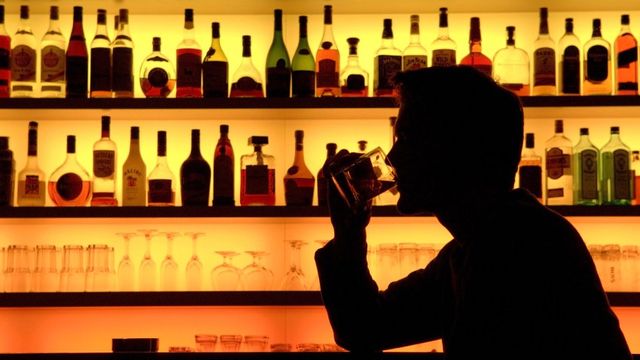
If a person has suffered a stroke, then his blood vessels have already suffered severe damage. Due to the disruption of blood flow, they dried out and became fragile. Exposing blood vessels to additional stress can lead to hemorrhage, which can be fatal.
When drinking alcohol after a stroke, the patient:
- Increases the risk of developing pathologies of the cardiovascular system. In particular, atherosclerosis develops, blood clots appear, and the walls of blood vessels become thinner.
- Increases blood pressure and blood glucose levels, which can cause ischemic stroke.
- It increases the level of cholesterol in the blood, which causes deposits to appear on the walls of blood vessels, and excess weight becomes a concern.
Toxic substances that are part of alcohol contribute to the destruction of red blood cells, which leads to disruption of gas exchange in the body.
This effect of alcohol makes its use after a stroke unacceptable.
When is drinking alcohol strictly prohibited?
It has been proven that drinking alcohol is considered one of the factors contributing to the occurrence of cerebral stroke. Alcoholic drinks increase blood pressure and also dilate and then sharply constrict blood vessels. This may cause hemorrhages.
- It is very dangerous to drink alcohol after a stroke; it can lead to serious consequences and thus provoke, for example, a second stroke.
- It is forbidden to drink alcohol for people whose joint mobility, impaired due to changes in the integrity of the brain vessels, has not been fully restored.
- Alcohol consumption is strictly prohibited in patients coded for chronic alcoholism. Here we are even talking not so much about the cardiovascular accidents themselves, but about getting rid of a bad habit.
Lacunar stroke
Lacunar stroke is a type of ischemic stroke of the brain, which in most cases occurs against the background of arterial hypertension. Caused by damage to perforating arterial blood vessels of the brain.
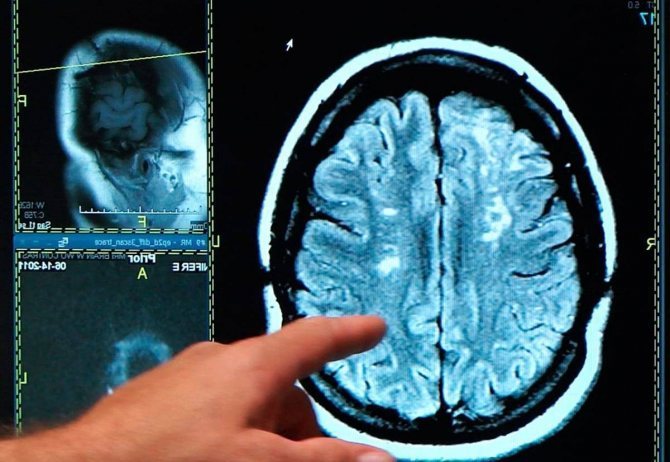
In addition to this kind of prevalence, this disorder is prone to frequent relapses, the number of which is 12%. Despite the relatively satisfactory condition after a lacunar stroke, the frequent occurrence of repeated strokes with the formation of lacunae leads to a specific complication - the lacunar state, which is the basis for the development of hypertensive encephalopathy and vascular dementia.
The disability group is assigned by MSEC. If after a stroke you are completely or partially unable to work and the rehabilitation period is slow, you must contact your doctor and take a referral for an examination. In addition, you will need to take many tests and undergo a large number of examinations. All this can be done in a hospital if the patient cannot do it independently in the clinic.
If a person has already been discharged from the hospital in order to formalize the disability, the relatives themselves have the opportunity to negotiate with the local doctor, after which the patient is hospitalized for further examinations necessary for presentation for examination. If the patient is ambulatory, he can take all referrals for examinations from the attending physician at the clinic at his place of residence.
In addition, you will need a referral for a medical and social examination. It will be issued at the district clinic after the commission has reviewed the medical history and examinations completed. The document must bear the signature of the chief physician of the clinic and the seal of the medical institution.
For several days, a patient with a right-sided ischemic stroke must be in a horizontal position with his legs elevated. 24-48 hours after the patient is taken to the neurology clinic, he is turned in bed and his airways are cleared. In case of prolonged vomiting, a nasogastric tube is inserted into the patient's stomach, and if swallowing is difficult, parenteral nutrition is prescribed, with nutrition entering the body intravenously. When treating strokes of the right half of the brain, effective medications and non-drug agents are used:
- The doctor constantly monitors blood pressure and, if it increases, prescribes antihypertensive substances.
- In the acute period, patients with ischemic stroke are prescribed Gordox and Contrikal.
- Even with the initial manifestations of insufficient blood supply to the brain, the patient is administered antiplatelet agents.
- In order to restore the functioning of nerve cells in the brain, drugs that have a neuroprotective effect are prescribed.
- To restore blood flow through the arteries of the right hemisphere of the brain, thrombolytic drugs are prescribed.
- When the patient's condition improves, speech therapists begin to work with him.
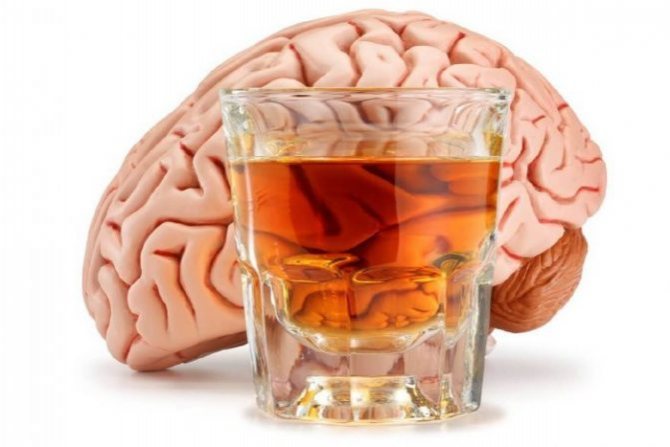
An ischemic stroke on the right side of the brain occurs as a result of a thrombus or embolus blocking the arteries supplying blood to the right hemisphere, and in addition, there is a pronounced vasospasm in this area. This circulatory disorder in the right hemisphere can be facilitated by hypertension with hypertensive crises and atherosclerosis of the brain vessels.
Fifty percent of patients have weakness of the left arm and leg, and there is loss of sensation in the left side of the face. In 1/3 of patients, there is a loss of pain sensitivity and the ability to distinguish the shape and temperature of an object by touch. In every tenth patient, lacunar hemorrhage in the brain is expressed by sudden dizziness and the inability to move without the help of others.
It is important!
Heart failure during stroke is a sign that indicates a very negative prognosis for the disease. Example - a person with a combination of extensive stroke and stage 3 heart failure has no more than a few days to live.
After the end of the rehabilitation period, the question arises again whether it is possible to drink alcohol after a stroke. Practice shows that a year's period is sufficient to restore the body, but there is no need to immediately return to all bad habits. Yes, a person wants to return to normal life again and pick up a glass of wine on a holiday. Don't think about it until official permission.
The end of the rehabilitation period allows a person to give up a nutritious diet, although almost no one does this. After a stroke, you no longer want to deal with serious illnesses again, so patients prefer to take care of themselves.
Doctors speak unequivocally about alcohol. They demand to completely stop using it, which is directly related to the unpredictability of changes in intracranial pressure. You shouldn’t tempt fate and test your body’s strength, because one day it may not be able to withstand the load.
It takes at least one year for the body to fully recover after a stroke. However, the end of this period does not mean that the patient can begin to live as before and drink alcohol in the same quantities as before the stroke. The best option would be to get additional advice from a specialist, who will most likely suggest postponing a return to alcohol for some time.
Symptoms
Symptoms: numbness in an arm or leg, loss of balance, distortion of the face
Symptoms that make it possible to determine the development of pathology in the brain:
- a sudden surge of weakness, sudden numbness of the lower and upper extremities;
- deterioration of body coordination;
- the appearance of intense pain in the head area, dizziness;
- nausea with vomiting;
- blindness and sudden darkening of the eyes;
- deterioration or complete loss of auditory and speaking activity for some time;
- paralysis of some parts of the human body;
- the appearance of weakness or spasm in the muscles.
People who have experienced the manifestation of such a disease are often interested in the question: “is it possible to drink alcohol after a stroke, in what quantity and what consequences may arise? After all, many mistakenly believe that reasonable alcohol consumption can provoke an attack of such a pathology.
Alcohol after a stroke: expert opinion
Cardiologists are constantly fighting for the health of the nation. In recent years, the average age of stroke has decreased, which shows the failure of convincing the population. People continue to mistreat their own health, step by step moving towards an attack. If the topic of alcohol comes up, doctors usually immediately divide into two groups. It is their opinion that is worth considering.
Red wine and cognac in small quantities are beneficial. This has been proven by studies that have shown beneficial improvements in blood circulation in the brain. This nuance turns out to be the ideal moment for patients to relax and begin to lead a wild lifestyle, but they should carefully monitor the amount.
More harm or benefit
In addition to the vascular system, alcohol also causes destruction to the heart muscle. Over time, muscle transforms into fat tissue. As a result, blood is unable to move through the vessels, which increases the likelihood of blockage.
Alcohol consumed in large quantities can affect the functioning of the organs of the hematopoietic system. Medical experts say that drinking alcohol negatively affects the functioning of the entire body. Among other things, alcoholics are prone to diabetes, which, in turn, can lead to stroke. You shouldn't joke with alcohol.
Many patients ask the question: “Is it okay to drink alcohol if you have a stroke?” Contrary to popular belief about the harmful effects of alcohol on the body, including the vascular system, not all types of alcoholic beverages are really that harmful. In some cases, drinking alcohol after a stroke can have a positive effect on a person's condition. The main thing is to follow a few rules:
- Alcohol after a stroke is allowed to be consumed only in strictly limited quantities.
- Before you start drinking alcohol, you should consult a specialist.
What alcohol can you drink after a stroke? A small amount of light dry wine can have a beneficial effect on the functioning of internal organs, as well as improve the quality of blood, slightly thinning it, which will help avoid the formation of blood clots and help normalize blood circulation. The standard dose of alcohol after a stroke is 150 ml of dry red wine.
Against the background of hypertension, wine can be consumed no more than twice a week, which contributes to the following positive aspects in the body:
- Prevention of coronary heart disease.
- Improvement of the vascular system.
- Normalization of fibrinogen synthesis.
- Prevents the formation of cholesterol plaques.
A special place among the alcoholic beverages allowed after a stroke is given to cognac. It is allowed to consume no more than 50 g of the drink daily, but this should not coincide with taking medications. This amount is enough to increase brain activity and restore pressure in the arteries.
Are there any benefits from alcohol?
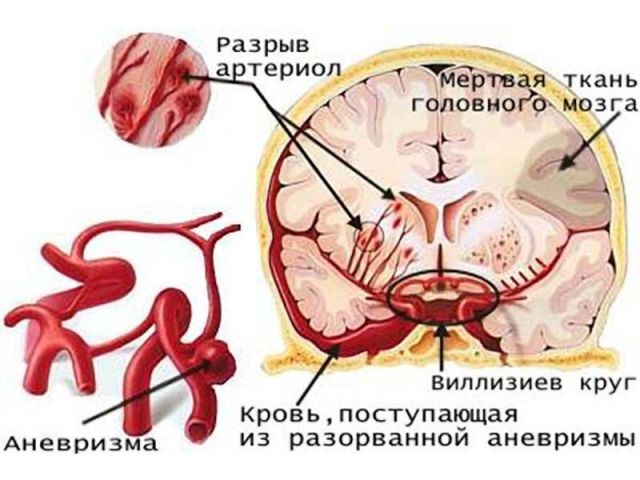
The list of permitted alcoholic drinks includes vodka, cognac, and red wine. However, even the exact amount of pure alcohol (% alcohol) varies in different sources from 12 to 30 g. For comparison: the volume of an ordinary tablespoon is 15 - 20 g. Will a person who is not accustomed to counting glasses be able to stop at one sip of alcohol - a rhetorical question . The volume and quality of alcohol are also important. One glass of vodka or (“or”, not “and”!) cognac up to 50 g or a glass of red wine (150 g) is acceptable. Red wine should only be dry and natural - dessert and fortified wines contain a higher percentage of alcohol. And it’s not worth talking about the dangers of artificially colored mysterious chemical solutions of unknown brands.
In addition, only a healthy person can afford to regularly drink a limited (!) amount of alcohol without significant harm to himself.
The first symptoms of a stroke
A stroke occurs due to a disruption in the blood supply to the blood vessels of the brain. A precursor to a stroke is a transient cerebral circulatory disorder or a transient ischemic attack. The main symptoms of such disorders are headache, weakness and dizziness. In more severe cases, nausea and vomiting begin.
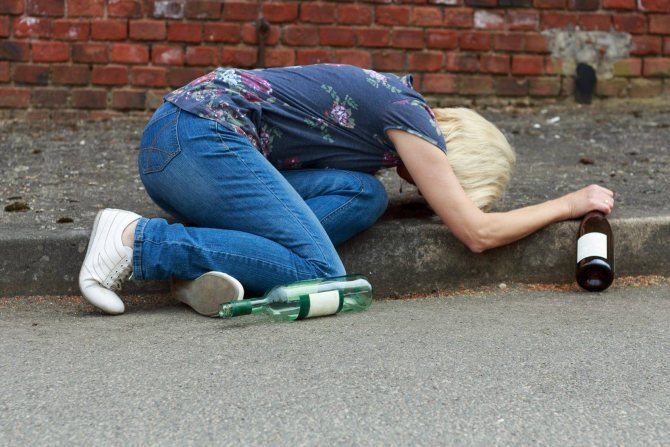
Among women
The most common signs of stroke in women are:
- Sudden loss of vision.
- Violation of coordination functions.
- Weakness of the limbs.
- Impaired understanding of words and loss of speech function.
- Hyposensitivity.
- Increased intensity of manifestation of the listed symptoms.
Quite often, a woman with a stroke exhibits a number of nonspecific symptoms, which significantly complicates the diagnosis of the disease and does not make it possible to provide medical assistance in a timely manner.
In men
In men, a stroke manifests itself with the following symptoms:
- Severe headache, in some cases accompanied by vomiting.
- Dizziness and weakness.
- Violation of visual and speech perception.
- Confusion.
If a stroke affects a certain part of the brain, then disturbances will occur in that part of the body for which this area was responsible.
Doctors identify a number of symptoms for which you should immediately call an ambulance. It is important to remember the time of onset of symptoms, as this will be of particular importance when choosing a therapeutic regimen. Simple tests for the presence of a stroke are:
- Please smile - against the background of a stroke, the smile is distorted.
- Ask to keep your hands raised. As a result of muscle weakening, this will be difficult to do.
- Ask the person to say a simple sentence. A patient with a stroke will speak slowly and hesitatingly, resembling the speech of a drunk.
- Please stick out your tongue. During a stroke, the tip of the tongue deviates towards the affected area of the brain.
So, are stroke and alcohol compatible?
Contraindications
Alcohol should not be taken while taking medications
In addition to the positive properties of some alcohol-containing drinks, there are factors with which it is strictly forbidden to combine alcohol consumption:
- drinking alcohol during treatment using pharmacological drugs or during the rehabilitation period;
- if the patient has congenital joint mobility;
- the integrity of blood vessels is damaged;
- genetic predisposition of the patient to chronic alcoholism.
A stroke from alcohol can occur if the patient ignores all the prohibited factors listed above and drinks, violating the quantitative norm.
After a person suffers a stroke, his blood vessels become more vulnerable to the effects of all kinds of irritants. When alcohol cocktails are abused in this state, the load and pressure in the arteries increases significantly, which provokes a violation of their integrity, the occurrence of stroke symptoms and, in the worst case, death.
